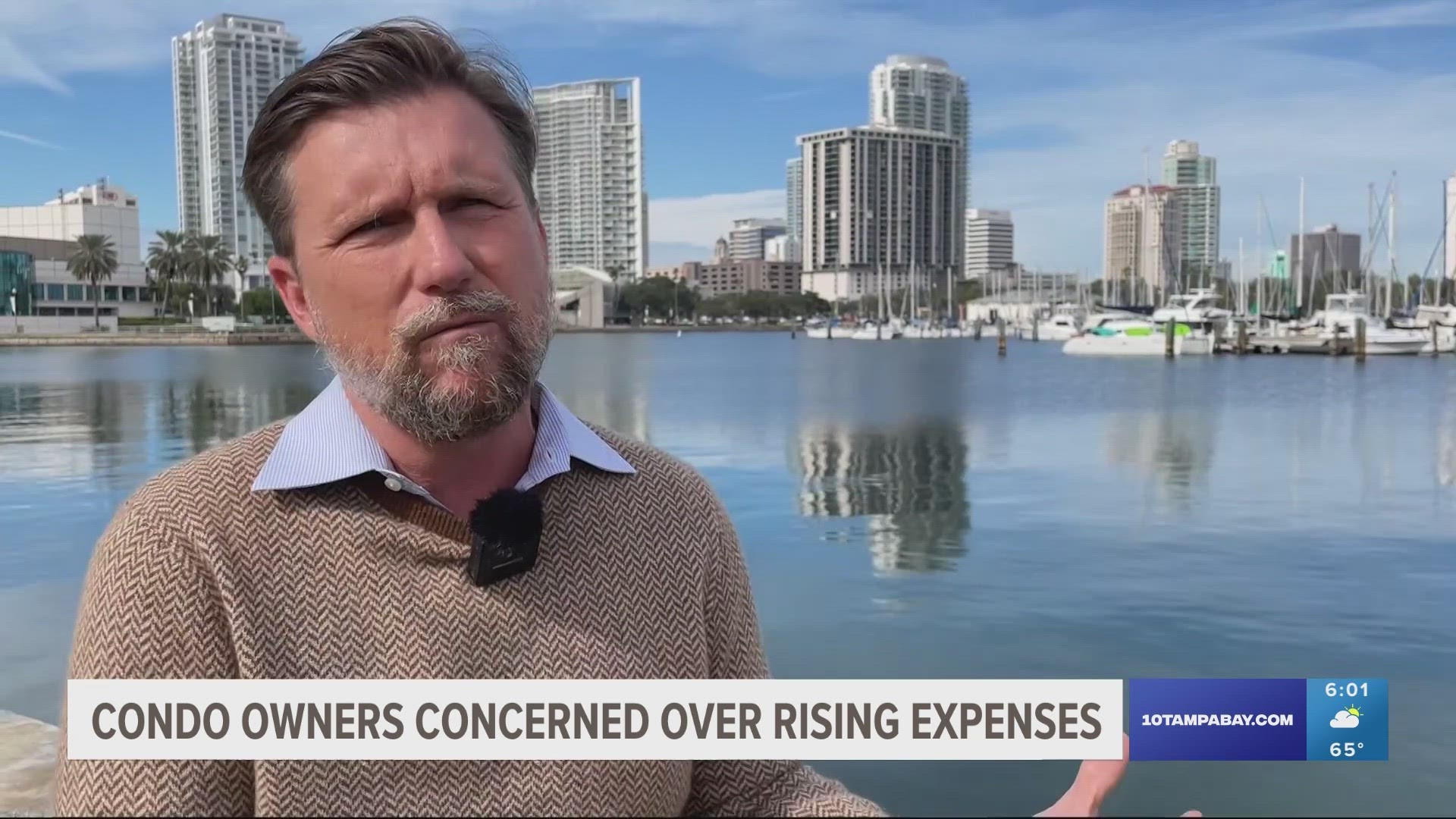ST. PETE BEACH, Fla. — Condo owners across Florida are feeling the pinch with rising monthly costs that some say could be forcing them out of their homes. A group of them are urging lawmakers to ease the burden with reforms during their upcoming legislative session.
“As of the first our COA went to $905 [a month], that's up from $575 in all in 2023,” Anne Marie Riedel, a board president for a small condo association in south St. Petersburg, said.
“Unfortunately, we have three units that will be going on the market because they feel that that the increase is just too much,” Riedel added.
They’re not alone, extra costs are being felt by a lot of the 1.5 million condominiums across the state, including the ones who just recently moved in.
“I’m sure they feel like they got the bait and switch, and they’re like oh you know Florida is affordable, no it’s not,” said Celeste Noren, a Pinellas County condo owner who says her HOA fees have doubled.
Noren moderated the town hall meeting in St. Pete Beach to discuss the issues among others like herself as well as state lawmakers and market leaders.
“I know it's kind of a cliche, but it's a perfect storm,” said Travis Moore, president of Moore Relations Inc., and one of the expert panelists.
On the radar of the “perfect storm” are skyrocketing property insurance costs and a lack of options with insurers leaving the state.
Riedel says her association was only able to find one insurer willing to write their policy and the premium cost just increased by more than 50%.
But insurance is not the only driving factor, a new state law and safety regulations put in place following the 2021 Surfside Condo collapse are also playing a role. The law requires condo associations to have fully funded reserves in place to make any necessary repairs.
Associations have to have that money set aside by the end of the year, and while trying to make up ground were forced to raise HOA or COAs to make up the difference. Riedel says her association was about 68% funded entering this year.
“Nobody has been running around saying we don't want safe buildings, but they have been saying Look how do we pay for it? How do we get there? So we can kind of glide path our way into fully being compliant,” Moore explained. He’s a government affairs specialist and has worked to help draft legislation in Tallahassee.
“I think legislators and policymakers are beginning to see [the issue] and know that we need to make some adjustments,” Moore added.
While he says fixing the insurance market as a whole isn’t a reality for the upcoming legislative session, there could be some reforms made to keep safety paramount but also help condo owners from taking on so much extra cost at once.
“There will be some tweaks, I think there's going to be some efforts to try to provide for ways to finance without having to just do all cash, maybe lines of credit, some of those types of things,” Moore explained.
The town hall had dozens in attendance with concerns raised over fully funding reserves, costs from added special assessments, and keeping up with regular maintenance fees.
Ken Edwards, who resides at Bay Island Condominiums, voiced worries over the impact on those living on fixed incomes, including veterans.
"It hurts because you know that your neighbor is not going to be able to live there anymore," Edwards said.
Rep. Linda Chaney (R-St. Pete Beach) said lawmakers are banking on previous legislation that had been passed as one way to stabilize the situation and provide support in the long term.
Chaney referred to less litigation taking place and more insurance companies for people to choose from, however, recognizes that relief can take time.
Edwards said he is "cautiously optimistic" lawmakers can come up with more insurance-related regulations, along with changes around the reserves and funding requirements. He also said he hopes there are more ways to hold boards and property managers accountable.
The concerns come as Florida has seen a 102% increase in homeowners insurance prices in the last three years, according to the Insurance Information Institute. The state leads the nation in average premium costs in the country, which was about $6,000 last year or three and a half times the U.S. average.
Spokesperson Mark Friedlander said prices are expected to increase in 2024.
"It won't surprise us that on average you'll see a double-digit increase, but we're certainly hoping rate increases won't be anywhere near the 42% averages that we've been seeing over the past year," Friedlander said.
The legislative session begins next week, 10 Tampa Bay will keep you informed as any bills are introduced and/or passed.
10 Tampa Bay's Miguel Octavio contributed to this report.

